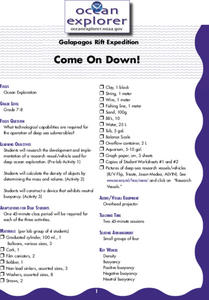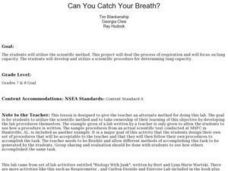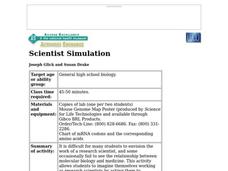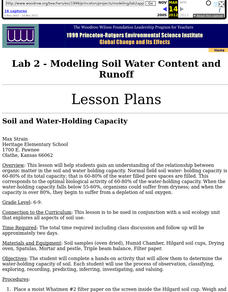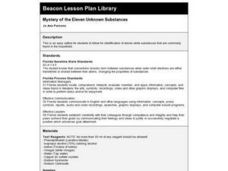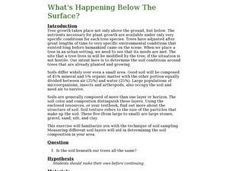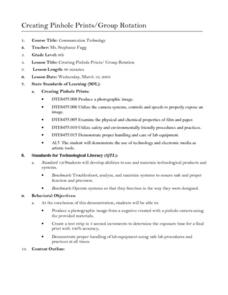Curated OER
Galapagos Rift Expedition Come On Down!
Students research the development and implementation of a research vessel/vehicle used for deep ocean exploration. In this oceanography lesson, students calculate the density of objects by determining the mass and volume.
Curated OER
Wolf Pack in a Bottle
High schoolers participate in an activity of a mock electrophoresis using paper chromatography to study DNA and genetic restriction mapping.
Curated OER
Molecular Evolution in Plants
Students are using a paper chromatography study that is suitable for introductory biology. The absorption spectra studies and gel electrophoresis studies are appropriate for students who have complete both introductory biology and...
Curated OER
UV Radiation and the Developmental Stages of Red Flour Beetles
Students perform an experiment to compare the sensitivity of the various developmental stages of Red Flour Beetles to ultraviolet radiation. Larvae, pupae and adult beetles are exposed to a source of UV-B radiation. In groups, they...
Curated OER
Molecular Evolution in Plants
Young scholars examine chlorophylls. They explore the absorbing pigments in a variety of plants. Through activities, students determine spectrophotometrically. They compare plant proteins from the family Brassicace to assess the level...
Curated OER
Can You Catch Your Breath?
Students apply the the scientific method to an investigation.They develop and perform a scientific procedure for determining lung capacity. In addition, they write a report to display information and share their procedures with the class.
Curated OER
It's Okay to Exhale: Photosynthesis and Cellular Respiration
Students will observe the differences between photosynthesis and cellular respiration. Then they observe the links due to climate changes and relate how climate change affects their lives.
Curated OER
Reading and Thinking About Evolution
Young scholars explore evolution. They read magazine articles related to evolution. Students describe arguments for/against evolution that the author used. Young scholars discuss their findings.
Curated OER
Jeannette
Students develop hypothesis about what might happen when salt water is frozen. In groups, they freeze ice samples with different salt concentrations. They use the internet to research the situation of the Jeannette to discover their...
Curated OER
Fossils and Migration Patterns in Early Hominids
Students plot the locations where major fossils of hominids have been found to extrapolate possible migratory patterns.
Curated OER
A Worm World
Students maintain a compost bin and build a worm observatory. They design experiments relating to worms and record observations in a worm journal.
Curated OER
Scientist Simulation
Learners imagine themselves working as research scientists completing the end-steps of a molecular research project and interpreting the data. They compare the gene sequences of normal and abnormal mice and evaluate the protein product...
Curated OER
Estimating the Live Mass of Dinosaurs
Students estimate the live mass of dinosaurs. Using dinosaur and modern animal models, students use simple displacement methods to calculate the volume of the models. They calculate the masses of each model. Students compare the...
Curated OER
The Cricket and The Plant
Students examine determine the symbiotic relationship between plants and animals as the find ways to naturally reduce carbon dioxide emissions. They study the carbon cycle. They work with probe and graphing calculator to examine the...
Curated OER
Does Dye Die...? : Foreign Chemicals In Our Environment
Students work as scientists to simulate testing on soil, plants, and water for foreign chemicals through this series of experiments.
Curated OER
Permeability of Earth Materials
Students observe and classify the permeability of a variety of materials.
Curated OER
Mystery of the Eleven Unknown Substances
Fourth graders identify eleven white substances that are commonly found in the household. They, in pairs, perform experiments on a variety of substances, and must identify them based on the reactions they observe.
Curated OER
What's Happening Below The Surface?
Students determine the soil composition of soil layers in their area. They collect soil samples, calculate the percentage soil water content, analyze data, and evaluate each site for future tree growth.
Curated OER
How Can We Accurately Make Different Solutions of Different Concentrations?
Students work together to create different solutions made from different concentrations of liquids. They record and analyze their data. They answer discussion questions to complete the lesson.
Curated OER
Creating Pinhole Prints
Ninth graders produce an image from a negative created with a pinhole camera using the provided materials and create a test strip in 5 second increments to determine the exposure time for a final print.
Curated OER
SEPARATION OF A STARCH-GLUCOSE MIXTURE USING GEL FILTRATION
High schoolers make a starch-glucose solution and pour it through gel in order to separate the starch from the glucose. They examine how starch is a larger molecule than glucose and test for the presence of these substances using other...
Curated OER
Studying Living Organisms
Students discover and discuss the differences between prokaryotes and eukaryotes. Using a microscope, they examine various prepared slides of prokaryotic and eukaryotic organisms.
Curated OER
The Electrophoresis of Human Hemoglobin
Students analyze different types of hemoglobin. They use the technique of agarose gel electrophoresis to separate human hemoglobin molecules according to their electrical charge, size, and/or shape. Students relate the migration of...
Curated OER
Separating a Starch-Glucose Mixture Using Gel Filtration
High schoolers experiment using the basic principles of gel filtration. They use the gel filtration technique for testing for the presence of specific substances. Students discover that starch is a larger molecule than glucose.
Other popular searches
- Science Lab Equipment
- Science Lab Safety Equipment
- Science Laboratory Equipment
- Earth Science Lab Equipment


